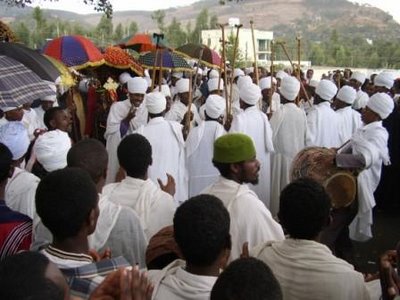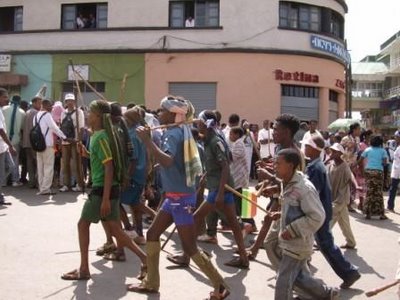


 Dancing priests
Dancing priests
 Getting soaked in holy water
Getting soaked in holy waterToday (Jan 19th) is “Timkat”: one of the most important holy days in the Ethiopian Orthodox Church and a good opportunity for us to be tourists instead of workers. Timkat (Epiphany) celebrates the baptism of Christ and is one event that brings tourists from all over the world to Gondar. Even if you didn’t know about Timkat you would guess something is up from the sudden increase in ferenjis in Gondar. Timkat is famous and is an amazing spectacle. Every Orthodox church has what is supposed to be a replica of the Ark of the Covenant, called a tabot, which is stored in the “holy of holies” in the centre of the church. Only the church priests are allowed to see the tabot, and the tabot itself is only ever brought out of the church for Timkat. The Ethiopian Orthodox Church claims to have the actual Ark of the Covenant, stored in a church in the ancient city of Axum. Since the priest of that church is the only person allowed to see it the claim has never been verified, although there is lots of historical evidence to back up the claim. The Timkat celebrations start on the afternoon of the 18th, when the tabot from each church is very slowly carried on the head of a priest, wrapped in colourful cloth as only the priest is allowed to see it, through the streets to Fasilides Bath, a 17th century palace in Gondar. Each tabot procession is surrounded by hundreds of people chanting hymns, singing, dancing and clapping. By about 6pm the tabots have arrived at the baths where an all night “mass” takes place. Even though I was working at the college on Thursday afternoon there was a real festival atmosphere, with the sound of singing and chanting drifting all over Gondar. Most visitors go to the baths early in the morning to see the climax of the celebration. In the baths is a large pool which the priests, after a very long service, bless. Traditionally, once the water has been blessed people jump into the pool while the water is also splashed onto the crowds to bless them. We went to the pool, which is only 10 min walk from our house, at 5am this morning and stood amongst hundreds of Ethiopians, for whom this was a very important and profound religious celebration. I felt a bit like a gawping tourist, but many people at college had assured us that visitors are welcome. Even then, although I took pictures I didn’t use the flash. Many of the Ferenji tourists were somewhat less discreet although the Ethiopians didn’t seem bothered. The atmosphere was hard to describe. On one level it was just a gathering of people, made somewhat less special as it was held around a much smaller pool than the usual one, the “proper” pool being closed for restoration work, but after a while I became more and more aware of just how ancient this celebration is. Many of the customs, practices and rituals of the Orthodox Church come straight from Judaism, so the Timkat celebration is many hundreds of years old, and has not changed much if at all in that time. Despite some modern trappings such as the tannoy system to better convey the constant chanting and praying of the priests, this service probably would have looked the same one thousand years ago. Many people prostrated themselves, while some people were silently praying while reading the Amharic version of the bible. I felt quite humbled and awed by the depth and scale of belief, and aware of just how important the Orthodox Church is. Ethiopia is a deeply religious society, which goes some way to explaining the incredible stoicism of the Ethiopian people in the face of so much hardship. We stood in amongst the worshippers through dawn until, at around 7.30am, the final blessing took place. A sudden frenzy of water splashing started, with people going into the pool and using plastic bottles to scoop up water which was then thrown over the crowd. Once somebody had been splashed (drenched in some cases!) they would leave and other people would replace them. Children stripped off and jumped into the pool while everybody just looked ecstatically happy at being soaked by the blessed water. At 8.30am the priests, who had been chanting and praying all night, placed the tabots back onto their heads and started the procession back to their churches, again surrounded and followed by hundreds of chanting, singing and dancing worshippers. The processions take hours, all day even, to get to their churches, distances which are normally walked in 30mins or less, such is the amount of singing and dancing taking place. All day today we have heard singing and chanting from all over Gondar as the processions slowly make their way through the streets. I feel very lucky to be living here in Gondar and being able to see Timkat. I’d love to know what the tourists make of it all. I’m even more curious to know what Ethiopians make of all these Ferenji tourists watching their Timkat celebrations while laden with cameras.












